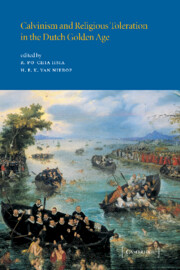Book contents
- Frontmatter
- Contents
- Notes on contributors
- 1 Introduction
- 2 ‘Dutch’ religious tolerance: celebration and revision
- 3 Religious toleration in the United Provinces: from ‘case’ to ‘model’
- 4 The bond of Christian piety: the individual practice of tolerance and intolerance in the Dutch Republic
- 5 Religious policies in the seventeenth-century Dutch Republic
- 6 Paying off the sheriff: strategies of Catholic toleration in Golden Age Holland
- 7 Sewing the bailiff in a blanket: Catholics and the law in Holland
- 8 Anabaptism and tolerance: possibilities and limitations
- 9 Jews and religious toleration in the Dutch Republic
- 10 Religious toleration and radical philosophy in the later Dutch Golden Age (1668–1710)
- 11 The politics of intolerance: citizenship and religion in the Dutch Republic (seventeenth to eighteenth centuries)
- Select bibliography
- Index
11 - The politics of intolerance: citizenship and religion in the Dutch Republic (seventeenth to eighteenth centuries)
Published online by Cambridge University Press: 08 July 2009
- Frontmatter
- Contents
- Notes on contributors
- 1 Introduction
- 2 ‘Dutch’ religious tolerance: celebration and revision
- 3 Religious toleration in the United Provinces: from ‘case’ to ‘model’
- 4 The bond of Christian piety: the individual practice of tolerance and intolerance in the Dutch Republic
- 5 Religious policies in the seventeenth-century Dutch Republic
- 6 Paying off the sheriff: strategies of Catholic toleration in Golden Age Holland
- 7 Sewing the bailiff in a blanket: Catholics and the law in Holland
- 8 Anabaptism and tolerance: possibilities and limitations
- 9 Jews and religious toleration in the Dutch Republic
- 10 Religious toleration and radical philosophy in the later Dutch Golden Age (1668–1710)
- 11 The politics of intolerance: citizenship and religion in the Dutch Republic (seventeenth to eighteenth centuries)
- Select bibliography
- Index
Summary
Over the past two decades, a remarkable shift has taken place in our evaluation of the religious situation in the Dutch Republic. For a long time Calvinism was seen as the dominant force in Dutch society. Textbooks, such as K.H.D. Haley's The Dutch in the Seventeenth Century (1972), or J.L. Price's Culture and Society in the Dutch Republic in the Seventeenth Century (1974) discussed the position of Catholics, Mennonites, and other so-called minority religions, in terms of toleration. The civic authorities, often liberal in private, had allowed their Churches to practise their rites as long as they did so discreetly, and as long as they were prepared to pay the occasional bribe that persuaded the men in charge to keep looking the other way.
Today, many Dutch historians tend to depict the Calvinist Church as one among the many Churches of the Republic, its membership covering less than half of the population of the Republic. Of course, the Calvinists had their political privileges, but day-to-day practice came closer to a seventeenth-century equivalent of a multi-cultural society. In the fourth volume of A.Th. van Deursen's Het kopergeld van de Gouden Eeuw (1981) we see the first signs of this new picture emerging in his discussion of ‘popular religion’.
- Type
- Chapter
- Information
- Calvinism and Religious Toleration in the Dutch Golden Age , pp. 159 - 176Publisher: Cambridge University PressPrint publication year: 2002
- 5
- Cited by



